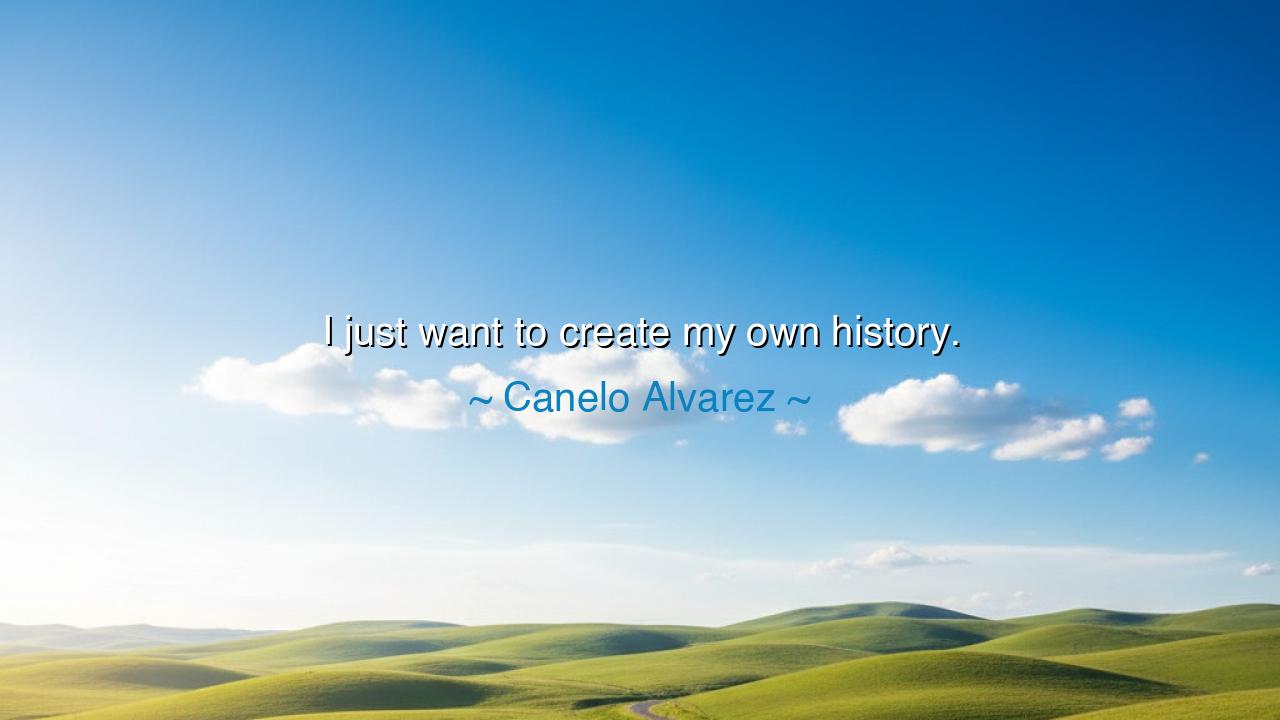
I just want to create my own history.






“I just want to create my own history.” Thus spoke Canelo Álvarez, the champion of the ring, whose fists have carved glory from sweat and struggle. His words, though simple, burn with a timeless fire—the yearning of every soul to stand not in another’s shadow, but in the light of its own making. For in this declaration, Canelo does not merely speak of victory or fame; he speaks of legacy, of the sacred human desire to shape one’s destiny through will, discipline, and unrelenting purpose.
In the ancient world, the heroes of myth and memory shared this same cry. They too sought to create their own history, to leave behind a story that would outlive the flesh. Yet what Canelo reminds us is that history is not inherited—it is forged. Though one may be born into greatness, or poverty, or obscurity, the writing of one’s own story belongs to the courageous heart. To create one’s history is to take the pen from the hands of fate and say, “I will write this myself.” It is a rebellion against passivity, a declaration that life will not simply happen to us—we will happen to life.
Canelo Álvarez’s journey began not in palaces or privilege, but in the humble soils of Guadalajara, Mexico. Born into a world where dreams were often smaller than survival, he rose through hardship with only his hands and his will. Each fight, each round, was a page in his unfolding story. He faced opponents stronger, faster, and older, yet refused to let the judgments of others define him. He fought not merely for titles, but for identity—to prove that his life would not be a footnote in someone else’s saga. In this, Canelo stands in the lineage of all those who turned adversity into authorship, who chose action over complaint, purpose over comfort.
The ancients would have understood him well. For what is the story of Alexander the Great, or Achilles, or Hercules, but the tale of men who refused to dwell in the shadows of others’ legends? They too sought to create their own history, to carve their names into the walls of time. Yet they also knew that to do so requires not pride, but devotion—the ceaseless honing of the self. Canelo’s discipline, his tireless training, his hunger to evolve, mirrors that same heroic pursuit: to make oneself worthy of remembrance through excellence and endurance.
But there is a deeper wisdom hidden in his words. When Canelo says, “I just want to create my own history,” he speaks also to the modern heart, so often trapped in imitation. In an age where many seek validation through comparison, his message is a call to authenticity. He reminds us that greatness is not in outdoing others, but in fulfilling one’s own potential. The artist, the teacher, the craftsman, the thinker—all must heed this truth: you cannot live a borrowed story. To copy is to vanish; to create is to live forever.
Consider also the story of Frida Kahlo, another child of Mexico, whose art was born of pain but became her freedom. She did not paint to please others, nor to follow the styles of her time. She painted herself, her struggle, her soul. In so doing, she too created her own history—a history that now inspires the world. Like Canelo, she proved that the act of creation, whether through art or perseverance, is the highest form of self-liberation. For those who dare to create their own history do not merely live—they transcend.
So let this be your lesson: do not wait for the world to write your story. Do not measure your worth by the legacies of others. The heroes of every age began as unknowns, yet they carved their paths with courage and conviction. Whether your arena is the ring, the workshop, or the classroom, enter it as Canelo does—with the fierce will to make your mark. Every act of courage, every refusal to surrender, is a stroke upon the canvas of your destiny.
And when your final chapter is written, let it be said not that you followed, but that you forged—that you lived as one who dared to create your own history. For in that creation lies the essence of all greatness: not the imitation of glory, but the birth of your own legend, carried forward in the hearts of those who, like you, will one day rise and say, “I too will write my own.”






AAdministratorAdministrator
Welcome, honored guests. Please leave a comment, we will respond soon